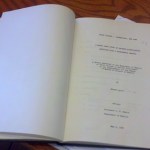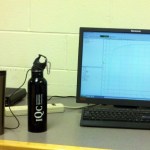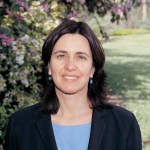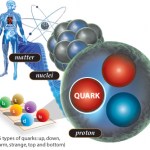Free Thought
We cleared a bunch of space in our deep storage area over the summer, and one of the things we found was a box full of old student theses from the 1950's and 1960's. The library already had copies of them, but I thought it was sort of cool to have a look into the past of the department, so we put them up on a shelf in the office. Yesterday, I was glancing over this, and spotted a thin volume, pictured in the "featured image" above, which was a Master's thesis from 1960 (when we used to give MS degrees in physics...) titled "A Monte Carlo Study of Neutron Scintillation Detection with a…
The Bottleneck Years
by H.E. Taylor
Chapter 59
Table of Contents
Chapter 61
Chapter 60
L1 Roustabouts, February 15, 2058
The L1 crew were not like the moon colonists. They were cowboys. We didn't get up-close and web-personal with them. The corporate imagery around them played up rugged individualism and avoided any mention of colonization. They were all young men, no women, no families. Anytime we saw them they were sparring, jousting and joking with each other in good natured bonhomie. Or acting like boy scouts. It was all completely phony.
Arguably what the L1 astronauts were doing…
What if you went to drive to work one day and the highway on ramp was closed, and a big sign across it said "Highway is closed. Sorry for the inconvenience."
Well, you would find your way to a different highway entrance. But say that one was closed as well.Then, you check around and find out that all the highways in your state are closed because the state decided to close them. No more highways for you.
Or, one day you go to check the mail and there is a single post card, and nothing else, in your mail box. The post card reads "The United States Postal Service has permanently suspended…
Choosing Real-World Impact Over Impact Factor
Practicing Freedom in the Digital Library
Dandelions, Prestige, and the Measure of Scholars
Programmers insist: “Everybody” does not need to learn to code
Digital Decay by Bruce Sterling
New York Public Library Rethinks Design
CIOs Wear Second Hat (ie. head of small colleges libraries too)
Can't Buy Us Love: The Declining Importance of Library Books and the Rising Importance of Special Collections
A New Polemic: Libraries, MOOCs, and the Pedagogical Landscape
Ethical reflections on MOOC-making (Rebecca Kukla)
Why Teach English?
Learning Styles:…
Newsbiscuit is my favourite humour site and has been for a while. The dry British humour combined with OTT story ideas is irresistible.
And speaking of irresistible, I just love this one:
Disappointment for scientists as new super-computer fails to go mad
Scientists at Mal-Tech University, Wisconsin have expressed their immense disappointment at the failure of their new super-computer Off White to show any signs of megalomania.
The technological titan went online six months ago has since performed flawlessly, displaying nary a hint of sentience, lunacy or vague curiosity. Project leader…
Change Rhetoric: Good and Bad
Three challenges: Engaging, rightscaling and innovating
Time for a little dissent
To Be Or Not To Be A Library Director
How to Answer “So You Need a Degree to Do That?”
Putting Things in Perspective
Here’s how Amazon self-destructs
Amazon vs. your public library
Small Pieces Loosely Kludged: Peer Review and Publication in Math Scholarly Communication
The Awesomest 7-Year Postdoc or: How I Learned to Stop Worrying and Love the Tenure-Track Faculty Life
If We Share Data, Will Anyone Use Them? Data Sharing and Reuse in the Long Tail of Science and Technology…
Google's official blog has a post today on the first computer in Israel: WEIZAC, built at the Weizmann Institute in the 1950s. Prof. Aviezri Frenkel gives a charming description of the project, including the fireworks when the machine was first turned on, in the presence of the VIPS who had come to see the new wonder.
http://googleblog.blogspot.co.il/2013/06/remembering-weizac-beginning-of.html
The foresight of the scientists who decided to build the computer is mentioned. But we can also thank them for their foresight in preserving this piece of computing history once newer computers…
Welcome to the most recent installment in my very occasional series of interviews with people in the publishing/science blogging/computing communities. This latest installment is with Mark Patterson, Executive Director of new OA publisher eLife. I attended an ARL Directors briefing conference call on eLife with Mark a little while back, highlighting for me just how interesting this project is and just how little I knew about it before the call.
Hence, this interview.
A huge thanks to Mark for agreeing to participate!
=============
Q0. Mark, tell us a bit about yourself and how you…
The department of Astronomy & Astrophysics is proud to announce a special colloquium by a distinguished visitor:
TITLE: Emission Lines Accompanying Gamma-Ray Flares from the Tidal Disruption of Dyson Spheres by Binary Intermediate-Mass Black Holes at z ~ 10.
Special Lunch Talk, Monday, April 1, 2013
by Professor Rajesh Koothrappali, Circumference Institute
[Host: Hofstadter]
ABSTRACT: "I will begin this talk in medias res by assuming that Dyson spheres can exist as early as z~10. I will describe general relativistic electromagenetohydrodynamic simulations of the disruption of a Dyson…
It's been a while since I've done a post over-analyzing some everyday situation, because I've been too busy to do any silly experiments. We're on break this week, though, so I took a little time Monday to bring excessive technology to bear on the critically important scientific question: how good is my insulated Starbucks cup?
To back up a little bit, because it's always important to provide background and motivation when writing a lab report, I spend a lot of time working at Starbucks these days, because when I try to get work done in my office, people keep showing up wanting me to do stuff…
My blogging has been slacking, but I'm still reading a bunch that I just don't have time to comment on. So I'm going to experiment with a link dump at the end of the week. This first one features a couple week's worth of posts - feel free to start a discussion in the comments
Science
- Keith Kloor has a couple of posts in the past few weeks about GMO scaremongering. I waded into the comments there, with varying levels of coherance. I'm working on an analogy about GMOs and rockets... more on that later maybe.
- Maryn McKenna continues in her tradition of being terrifying on the antibiotic…
Prof. Shafi Goldwasser, who is at both the Weizmann Institute and MIT, will receive the 2012 A.M. Turing Award, together with Prof. Silvio Micali of MIT. Goldwasser is only the third woman to receive the Award since its inception in 1966, and she is the third faculty member of the Weizmann Institute to receive what is considered to be the “Nobel Prize in computing.”
Goldwasser and Micali’s work in the 1980s laid the foundations of modern cryptography – the science that, among other things, keeps your electronic transactions secure.
The basis of their work is a series of riffs on the…
I have a son who's currently a first year physics student. As you can imagine, I occasionally pass along a link or two to him pointing to stuff on the web I think he might find particularly interesting or useful. Thinking on that fact, I surmised that perhaps other science students might find those links interesting or useful as well.
By necessity and circumstance, the items I've chosen will be influenced by my son's choice of major and my own interest in computational approaches to science.
There’s more to mathematics than rigour and proofs
The ten commandments of student science blogging…
"The atoms come into my brain, dance a dance, and then go out - there are always new atoms, but always doing the same dance, remembering what the dance was yesterday." -Richard Feynman
Here you are, a human being, a grand Universe of atoms that have organized themselves into simple monomers, assembled together into giant macromolecules, which in turn comprise the organelles that make up your cells. And here you are, a collection of around 75 trillion specialized cells, organized in such a way as to make up you.
Image credit: J. Roche at Ohio University.
But at your core, you are still just…
A couple of astrostatistics related announcements:
1) The Astrostatistics & Astroinformatics Portal is open.
"The ASAIP provides searchable abstracts to Recent Papers in the field, several discussion Forums, various resources for researchers, brief Articles by experts, and lists of Meetings. The site will be used for public outreach by four organizations: International Astrostatistics Association (IAA, to be affiliated with the International Statistical Institute), American Astronomical Society Working Group in Astroinformatics and Astrostatistics, International Astronomical Union…
Over the last couple of weeks, I've been discussing How "They" See "Us," which is basically that "they" see "us" as pure evil. Well, maybe not always sheer evil, but certainly not good, and even more certainly as having ulterior motives, the most common of which is filthy pharma lucre. As a result, when a grant deadline approached, I reposted a post about the "pharma shill gambit." However, how do these brave maverick doctors see themselves? Given that I'm traveling (and my plans have been impacted by the big storm heading through Kansas and Missouri now, it seemed appropriate given that I…
Another list for your reading, gift-giving and collection development pleasure.
Every year for the last bunch of years I’ve been linking to and posting about all the “year’s best sciencey books” lists that appear in various media outlets and shining a bit of light on the best of the year.
All the previous 2012 lists are here.
This post includes the following: Cryptomundo The Top Cryptozoology Books of 2012.
The Beast Of Boggy Creek by Lyle Blackburn
The Bigfoot Filmography: Fictional and Documentary Appearances in Film and Television by David Coleman
The Encyclopaedia of New and Rediscovered…
Another list for your reading, gift-giving and collection development pleasure.
Every year for the last bunch of years I’ve been linking to and posting about all the “year’s best sciencey books” lists that appear in various media outlets and shining a bit of light on the best of the year.
All the previous 2012 lists are here.
This post includes the following: Christmas gifts 2012: the best science books, Best science books of 2012, Christmas gifts 2012: the best wildlife books.
The Particle at the End of the Universe: How the Hunt for the Higgs Boson Leads Us to the Edge of a New World by…
Another list for your reading, gift-giving and collection development pleasure.
Every year for the last bunch of years I’ve been linking to and posting about all the “year’s best sciencey books” lists that appear in various media outlets and shining a bit of light on the best of the year.
All the previous 2012 lists are here.
This post includes the following: ScienceGeek / Shabbeer Hassan Best Science Books of 2012.
Braintrust: What Neuroscience Tells us About Morality by Patricia Churchland
The Origins of Sex: A History of the First Sexual Revolution by Faramerz Dabhoiwala
Wired for…
Another list for your reading, gift-giving and collection development pleasure.
Every year for the last bunch of years I’ve been linking to and posting about all the “year’s best sciencey books” lists that appear in various media outlets and shining a bit of light on the best of the year.
All the previous 2012 lists are here.
This post includes the following: Township District Library Best Science Books of 2012.
The Bluebird Effect: Uncommon Bonds with Common Birds by Zickefoose, Julie
Brain on Fire: My Month of Madness by Cahalan, Susannah
An Epidemic of Absence: A New Way of Understanding…




